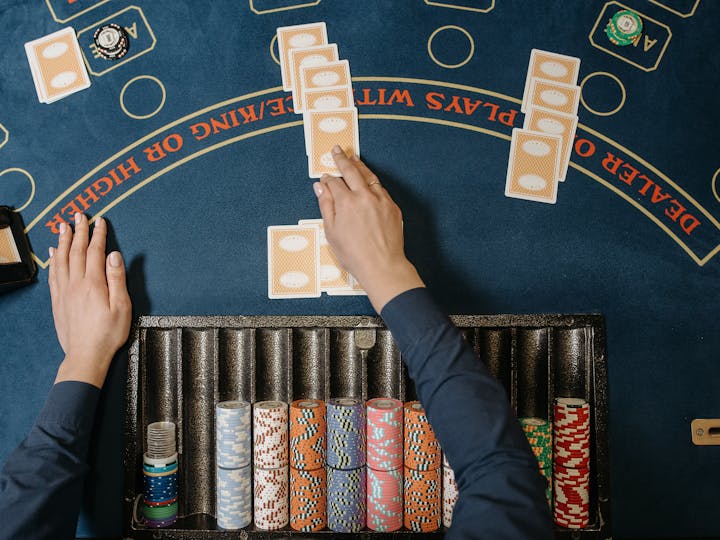When you step onto a casino floor, you can feel it that hum of energy, the clink of chips, and the quiet confidence of players who seem to know exactly what they’re doing. For some, the casino represents excitement and chance; for others, it’s a masterclass in discipline, patience, and financial strategy. Believe it or not, some of the world’s sharpest money minds are sitting at poker tables and roulette wheels, practising skills that translate beautifully into real-world budgeting.
Because whether you’re rolling dice or paying bills, money management is a game of strategy. The smartest players know how to stretch a budget, manage risk, and make every dollar count not just at the casino, but in everyday life.
And that’s the secret we’re unravelling today. From the psychology of betting to the principles of high-stakes finance, we’re taking lessons straight from the casino floor and turning them into smart, practical money tips you can use to build wealth, stay in control, and enjoy the thrill of smart budgeting. You’ll soon see why players who understand top online pokies Australia joka casino principles are also masters of money in their daily lives because the strategies that help you win at the tables can also help you win at life.
Lesson 1: Always Set a Budget Before You Play
Every successful casino player knows one rule above all: never gamble without a limit. That’s not just good advice for the tables — it’s a cornerstone of sound personal finance.
Before sitting down at a slot machine or blackjack table, experienced players set clear spending boundaries. They decide how much they’re willing to risk and stick to that amount. It’s a lesson that applies directly to managing your everyday budget.
Think of your monthly income as your bankroll. Before spending a cent, allocate it into clear categories — necessities, savings, leisure, and investment. This structure ensures you don’t “bet” more than you can afford on non-essentials.
Copywriter’s Tip:
Budgeting isn’t about restriction; it’s about freedom. When you know your limits, you spend confidently.
Lesson 2: Treat Every Dollar Like a Chip
In a casino, every chip represents potential not just money, but opportunity. Players who treat each chip with respect tend to last longer and play smarter. The same mindset should apply to your finances.
Imagine you’re holding a stack of chips at a table. Would you toss them away carelessly? Probably not. You’d weigh each bet, look at the odds, and play with intention. Now apply that same discipline to your everyday purchases.
Before you spend, ask: What’s the return on this? Will it bring value, joy, or growth? Or is it just a spur-of-the-moment spin that could drain your stack?
Practical Example:
Instead of impulse-buying a gadget, think like a player waiting for the right hand. Save your chips or dollars for when the odds are truly in your favour.
Lesson 3: The Psychology of Risk — Know When to Hold, Fold, or Walk Away
The difference between a seasoned player and a reckless gambler comes down to emotional control. Casinos teach you that risk is inevitable but how you manage it determines the outcome.
In finance, just like in gambling, emotion is your biggest enemy. The adrenaline rush of winning or the frustration of losing can cloud your judgment. That’s why professional players set strict exit strategies. They know when to walk away, whether ahead or behind.
Apply this to your financial life. Don’t chase losses if an investment isn’t performing, review and reallocate. Similarly, if you’re overspending in one area, have the discipline to pull back before it spirals.
Real-World Analogy:
Think of your savings as your casino bankroll. You don’t double your bets after a loss you reassess, stay calm, and play for the long term.
Lesson 4: Diversify Like a Casino
Casinos make money not by relying on one game, but by offering hundreds. Slots, poker, roulette, baccarat every table has a different audience and risk profile. This diversification protects the house and ensures steady profits.
You can do the same with your personal finances. Diversify your income streams and investments so you’re never reliant on a single source. Consider combining savings accounts, shares, side hustles, or even passive income from digital projects.
If one stream slows down, another can keep the cash flowing just as a casino balances its floor traffic.
Smart Move:
Invest time in learning about multiple financial instruments just as you’d learn different games. Knowledge spreads your risk.
🏦 Lesson 5: The House Always Wins — Unless You Play Smart
We’ve all heard the phrase “the house always wins.” It’s true casinos are built on mathematical advantage. But the key takeaway isn’t that you can’t win it’s that you have to play smart within the rules.
In life, the “house” is everything beyond your control taxes, inflation, market shifts. But by understanding the odds and playing strategically, you can still beat the system.
For example:
- Use tax-efficient investment accounts.
- Take advantage of employer super contributions.
- Pay off high-interest debt first (it’s the equivalent of playing against a bad hand).
💡 Lesson from the Table:
You don’t control the cards, but you control the bet. In both gambling and finance, your edge is your strategy.
🎯 Lesson 6: Plan for the Long Game
Casinos are built for the long term not quick wins. Their success comes from consistency and patience, not luck. That same mindset applies to personal wealth.
Quick wins like a lucky spin or a sudden stock surge — feel thrilling. But sustainable success is built through disciplined, repeated action. Regular savings, consistent investing, and long-term planning always outperform risky short-term plays.
💡 Pro Tip:
Treat your financial plan like a game of poker — not every hand is a winner, but over time, strategy always beats chance.
Lesson 7: Bankroll Management — The Core of Financial Survival
Ask any professional gambler about their number one rule, and they’ll tell you: protect your bankroll. It’s your lifeline.
Your bankroll is more than just cash it’s your ability to stay in the game. The same applies to personal finance. Your emergency fund, savings, and investments all act as your financial lifeline.
Here’s how to think like a high roller:
- Set aside a risk-free reserve: Always have funds untouched for emergencies.
- Don’t stake what you can’t afford to lose: Avoid overleveraging your credit or investments.
- Reinvest winnings strategically: Grow your capital slowly, not recklessly.
Financial Parallel:
Your goal isn’t to win every bet —it’s to stay solvent long enough to win consistently.
Lesson 8: Learn to Read the Room — and the Market
Casino pros don’t just watch the cards they watch the players. They read the energy, study behaviour, and adapt their strategy.
In finance, this means staying aware of trends, understanding the market, and timing your moves wisely. Don’t invest blindly or follow hype; observe, analyse, and act with intention.
Tip from the Pros:
Patience is profit. The best players and investors wait for the right moment before placing their biggest bets.
Lesson 9: Emotional Discipline Is Your Secret Weapon
The most dangerous opponent on the casino floor isn’t the dealer it’s your own emotions.
Fear, greed, excitement, and frustration can destroy good judgment faster than a bad hand. The same is true with money. Many people overspend when they’re happy and panic-sell when they’re afraid.
To budget like a high roller, learn emotional neutrality. Whether you win big or take a hit, stay calm, stay consistent, and stick to your strategy.
Practical Habit:
Before making a financial decision, take 24 hours to think. This “cool-off” period saves countless mistakes — in both casinos and real life.
Lesson 10: Know the Value of the “Edge”
In gambling, the “edge” refers to the advantage a player or house has in a game. Smart players spend time learning games where they can minimise the house edge like blackjack or poker through skill and strategy.
In finance, your edge is your knowledge. The more you understand about budgeting, taxes, and investment, the greater your advantage.
Action Plan:
- Take a short financial literacy course.
- Read one money management book each month.
- Track your spending weekly.
Knowledge compounds, just like interest.
Lesson 11: Reward Yourself Without Breaking the Bank
High rollers understand balance. They play hard, but they also know when to enjoy their winnings responsibly. In personal finance, rewarding yourself is essential — but it should never derail your progress.
Set up a “fun fund” — a small portion of your budget for indulgences. This keeps you motivated and prevents burnout.
Copywriter’s Tip:
When you budget for fun, guilt disappears. You can enjoy life and stay financially fit.
Lesson 12: Track Your Wins and Losses
Every professional gambler keeps meticulous records. They know exactly how much they’ve spent, won, and lost — because that’s how they refine their strategy.
Do the same with your finances. Tracking income, expenses, and investments reveals where you’re thriving and where you’re leaking cash.
Simple Strategy:
Use budgeting apps like Pocketbook or YNAB to stay aware. Awareness is control.
Lesson 13: Learn from Every Hand You Play
Every bet, win, or loss is data. The most successful players analyse their results, identifying patterns and improving over time.
In finance, reviewing your performance regularly helps you spot habits and opportunities.
- Overspending on weekends? Adjust your leisure budget.
- Growing your income? Increase your savings percentage.
Winning Habit:
Treat mistakes as lessons, not losses. Every misstep teaches you how to play smarter next time.
Lesson 14: Compound Wins — The True Jackpot
Casinos thrive on repeat play and financially savvy individuals thrive on repeat savings.
Compounding interest is the real-world equivalent of hitting a jackpot over and over. The earlier you start, the bigger your payout.
Example:
Saving $200 a month at 6% annual interest can grow to over $200,000 in 30 years — without ever “betting big.”
The secret? Consistency beats luck.
Lesson 15: Respect the Game — and the Money
High rollers respect the process. They know that carelessness is costly and discipline is power.
Treat your money with that same reverence. Every dollar deserves attention. Every budget deserves review. And every financial decision should be made with confidence, not impulse.
Mindset Shift:
Budgeting isn’t boring it’s empowering. It’s the quiet game where patience, knowledge, and control make you a winner.
Conclusion: The Real High Roller Mindset
When you watch a true high roller in action, you’ll notice something they’re calm, collected, and in control. They know that luck is fleeting, but discipline lasts forever.
That’s the essence of smart money management. The real “high rollers” in life aren’t the ones spending recklessly; they’re the ones who know exactly where every dollar goes, and they play the long game.
Budgeting like a high roller means blending strategy with excitement, confidence with control, and ambition with awareness. It’s not about playing it safe — it’s about playing it smart.



